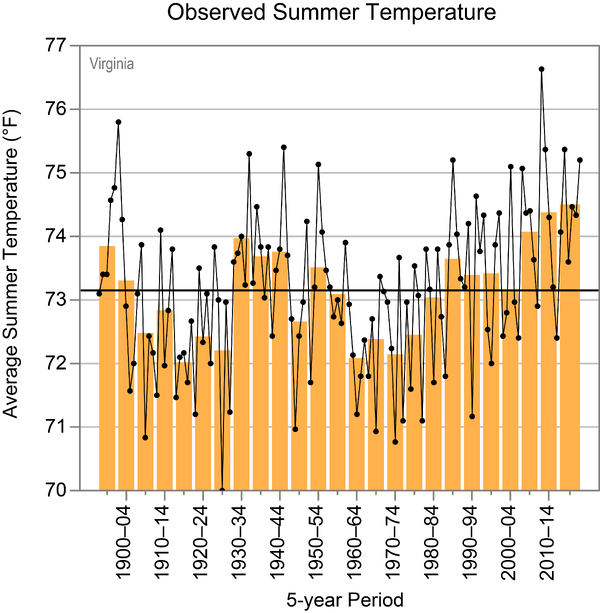
How to Protect Your Home from Extreme Heat and Humidity
Virginia's Extreme Heat and Humidity on Homes
Excessive heat is becoming more frequent in Virginia as a hotter-than-usual summer is likely to occur in the U.S. like many other parts of the country. The number of days with a heat index of 90°F or higher has increased in the commonwealth. In 2022, Richmond experienced eight more extreme heat days than in 1979. Add in the Mid-Atlantic humidity and heat index values soar.

Sources: CISESS and NOAA NCEI. Data: nClimDiv.
Although extreme heat does not cause sudden damage to your home, this type of severe weather can cause damage to structural elements, such as wood, paint, siding, and foundations over time. Virginia's climate of with extreme heat and humidity challenges the integrity of a home's structure and causes damage from mold, mildew, and termites.
How to Protect your Home From Extreme Heat
Taking care of spring home maintenance is a great way to begin preparing your home for summer heat. Then taking additional measures to protect the inside and outside of your home during hot weather will mitigate damage, lower your utility costs, and keep your home comfortable.
Protect the inside your home from extreme heat checklist
- Install and replace weather stripping on doors and windows.
- Properly seal and block air gaps around window air conditioning units.
- Upgrade when replacing windows to insulated double-pane.
- Check your refrigerator temperature and clean dust from cooling coils to prevent appliance overheating.
- Add heat control window film to reflect the sun.
- Install drapes, shades, or window tinting on every window.
- Insulate your attic and attic door.
- Install a whole-house attic fan.
- Encapsulate your crawl space to prevent the issue of heat and humidity-induced mold and mildew damage.
- Consider installing a backup generator in case of prolonged power outages.
- To keep yourself cool, use a breeze and air movement inside your home. Set ceiling fans to move counterclockwise.
- Fluctuating temperatures cause metal pipes to expand and contract, leading to leaks. Install water leak detection devices to protect your home from water damage caused by leaking or burst pipes.
- Service your air conditioning system annually and regularly change the filter.
- Use a dehumidifier to help control humidity inside your home. Excessive humidity, which often accompanies high temperatures, can cause corrosion and damage to outlets, wiring, and electrical devices. This problem can increase the risk of malfunction in your home system.
- Install a smart or programmable thermostat.
- Reduce the use of appliances that use energy and generate heat during the hottest parts of the day.
- Avoid using extension cords for fans or window-unit air conditioners — they raise the risk of electrical fire because they increase the demand on a single outlet or circuit.
Protect the outside your home from extreme heat checklist
- Coat and seal your roof against UV rays.
- Plant native plants (opens in a new window) that thrive in Virginia and do not need additional watering.
- Use reflective and light-colored materials when replacing a roof.
- Have your roof and attic inspected annually.
- Install vapor barriers to prevent expansion, warping, cracked shingles, and dried-out caulk.
- To create shade, add trees and awnings to your home's southern exposure. Plant trees at a sufficient distance from the foundation to avoid foundation damage due to roots, and consider a wildfire-defensible area if you live in a high-risk area of Virginia.
- Invest in light-colored paint elastomeric paint for stucco, concrete and masonry, roofs, brick, and metal exteriors.
- Extreme heat can cause paint to bubble and crack. These cracks can create openings that allow moisture to enter your home, attracting insects and causing mold and mildew growth.
- Regularly inspect wood siding, decks, trim, and other structures for any signs of damage.
- Apply a protective coating product to sun-exposed wood.
- Keep the soil around your home moist from time to time to prevent extreme heat from causing the earth to shrink and pull away from the foundation. Foundation problems cause issues in the rest of your home, such as sloping floors and windows or doors that do not close.
Does Home Insurance Cover Damage From Extreme Heat and Humidity?
Normal wear and tear from extreme heat and humidity on your home, such as stress on heating and air conditioning (HVAC) systems, roofing, and other home structures, is not covered by home insurance and requires regular maintenance to prevent damage. Homeowners insurance can cover damage caused by fire, falling trees, vandalism, lightning strikes, and other covered perils.
Extreme heat can be accompanied by drought conditions and wildfire and can be covered by home insurance. When drought conditions are exposed to sudden heavy rainfall, home flooding can also occur. High temperatures and overuse can cause excessive heat in your home's electrical system, increasing the danger of a fire. It's important to talk to a local agent in your community about common weather risks your home may experience and plan your insurance protection accordingly.
Sources:
https://statesummaries.ncics.org/chapter/va/
https://www.vaemergency.gov/threats/extreme-heat
THE NORTHERN NECK INSURANCE INTEGRITY PROMISE — We pledge to provide straight talk and good counsel from our NNINS Virginia insurance experts through our blog. While we hope you find this to be a helpful source of information, it does not replace the guidance of a licensed insurance professional, nor does it modify the terms of your Northern Neck Insurance policy in any way. All insurance products are governed by the terms in the applicable insurance policy.





